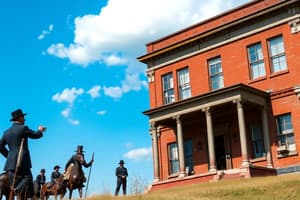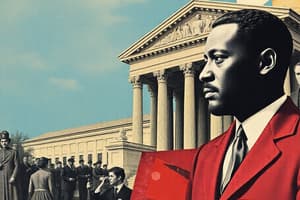Podcast
Questions and Answers
Who was Dred Scott?
Who was Dred Scott?
A slave who went to court to sue for his freedom.
Why did Dred Scott sue for his freedom?
Why did Dred Scott sue for his freedom?
He was a slave who lived in both slave and free territories and believed he was entitled to be free.
What was the decision in the Dred Scott case?
What was the decision in the Dred Scott case?
Initially, the Missouri Court decided that Scott would become a free man, but later ruled against it. The Supreme Court ruled against him, stating that slaves were property and did not have rights.
Who was Roger B. Taney?
Who was Roger B. Taney?
Who was Emerson?
Who was Emerson?
What were the three issues the Supreme Court considered in the Dred Scott case?
What were the three issues the Supreme Court considered in the Dred Scott case?
What was the final decision on those three issues?
What was the final decision on those three issues?
When did the Dred Scott case reach the Supreme Court?
When did the Dred Scott case reach the Supreme Court?
How did Northerners react to the Dred Scott case?
How did Northerners react to the Dred Scott case?
How did Southerners react to the Dred Scott case?
How did Southerners react to the Dred Scott case?
How did this court ruling enhance tensions leading to the Civil War?
How did this court ruling enhance tensions leading to the Civil War?
Who wrote the majority opinion on the Dred Scott case?
Who wrote the majority opinion on the Dred Scott case?
What was the split decision in the Dred Scott case?
What was the split decision in the Dred Scott case?
Who was originally supposed to write the majority decision?
Who was originally supposed to write the majority decision?
Why was the Dred Scott decision important?
Why was the Dred Scott decision important?
Who received Scott after Emerson's death?
Who received Scott after Emerson's death?
Why didn't Scott become free initially?
Why didn't Scott become free initially?
What was Sanford's argument in the case?
What was Sanford's argument in the case?
Flashcards are hidden until you start studying
Study Notes
Dred Scott Overview
- Dred Scott was an enslaved man who famously sued for his freedom in the courts.
- He lived in both slave and free territories, leading him to believe he was entitled to freedom.
Legal Proceedings
- The Missouri Court initially ruled in Scott’s favor, declaring him free.
- This decision was appealed, resulting in a later ruling against Scott.
- Ultimately, the U.S. Supreme Court ruled that slaves were considered property and did not possess rights.
Key Figures
- Roger B. Taney served as the Chief Justice during the Dred Scott case and wrote the majority opinion.
- Dr. Emerson, an army surgeon, was Scott’s second owner and took him into free territories.
Supreme Court Considerations
- The Court had to address three primary legal issues:
- The citizenship status of African Americans.
- Whether temporary residence in a free territory granted freedom to a slave.
- The constitutionality of banning slavery in the Louisiana Purchase.
Supreme Court's Final Decisions
- African Americans were deemed not to be American citizens.
- Living in a free territory did not grant a slave immediate freedom.
- The ban on slavery in the Louisiana Purchase was ruled unconstitutional, conflicting with the Missouri Compromise.
Case Timeline
- The Dred Scott case reached the Supreme Court in 1856.
- The Supreme Court's decision was split 7-2.
Reactions to the Case
- Northerners expressed concern that the ruling could lead to the expansion of slavery.
- Southerners reacted positively, reinforcing their stance on slaves as property.
Impact on Civil War
- The ruling heightened tensions between the North and South, escalating disagreements over slavery.
- Dred Scott v. Sandford is regarded as a pivotal case in America's slavery-related legal history and set the stage for future conflicts.
Post-Decision Context
- Chief Justice Taney was initially not the intended author of the majority opinion; Justice Nelson was supposed to write it.
- Emerson’s widow inherited the slaves after his death and passed the Scott family to her brother, John Sanford.
Other Facts
- Scott's initial request for freedom was denied due to the appeal process.
- Sanford argued that property rights could not be infringed upon without due process.
Studying That Suits You
Use AI to generate personalized quizzes and flashcards to suit your learning preferences.




